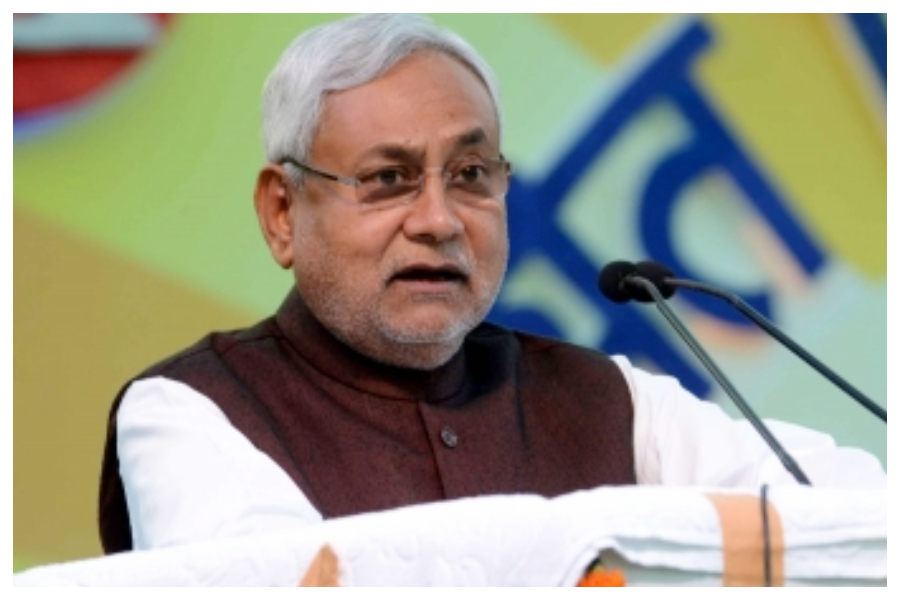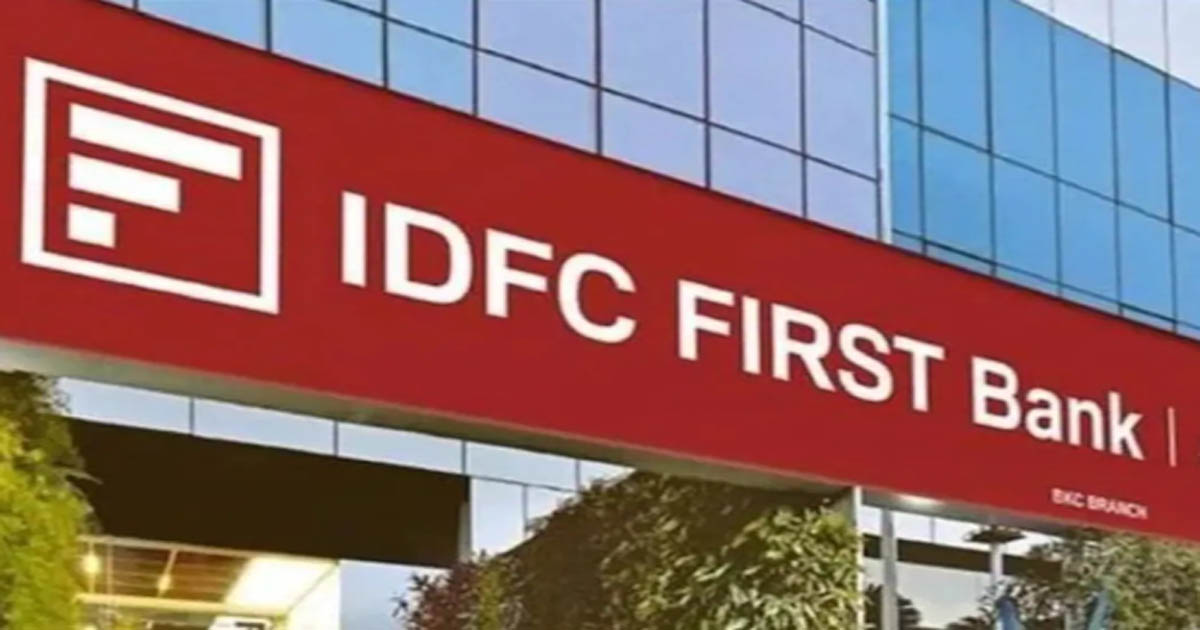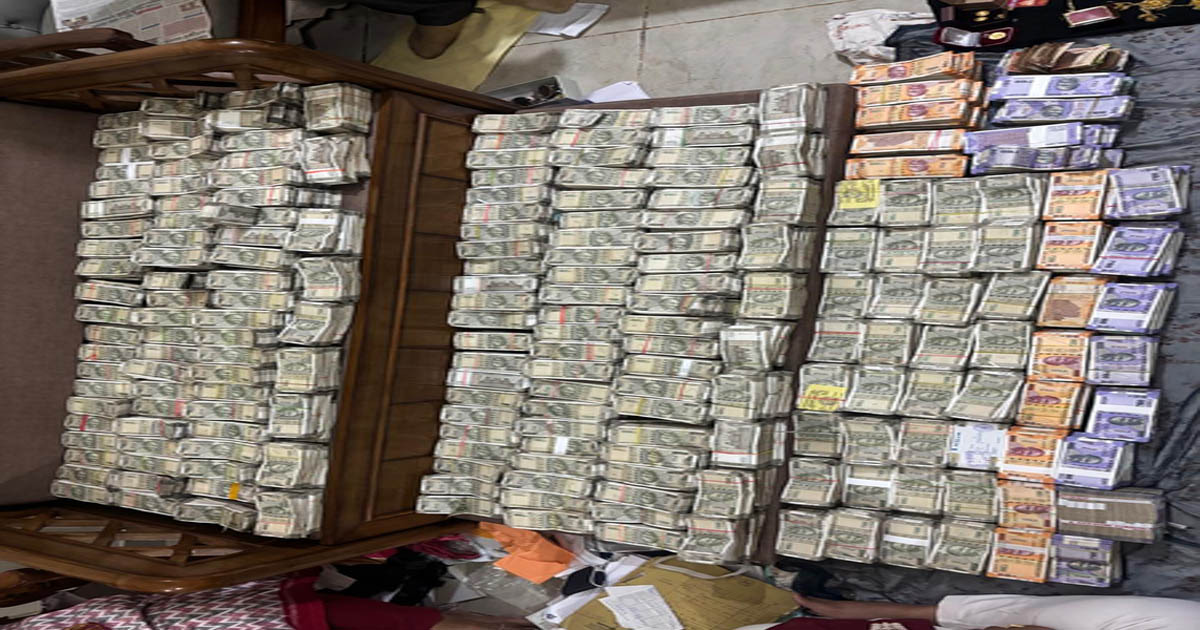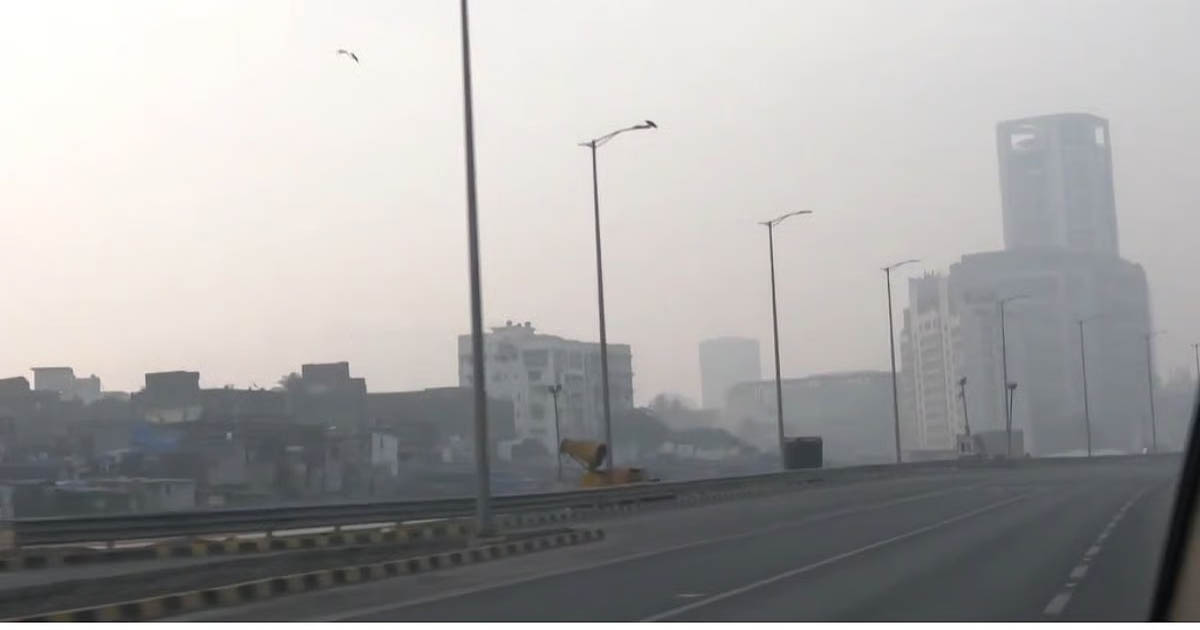National News
Nitish Kumar, socialist leader of Bihar, emerges as challenger to Modi-Shah

At a time when the duo of Narendra Modi and Amit Shah are dictating terms, Bihar Chief Minister Nitish Kumar not only challenged but also sent a message to the BJP and the RSS about his political daring without caring about the CBI, ED and the Income-Tax department.
Nitish Kumar, a socialist leader of Bihar, was elected as the chief minister for the eighth time.
Kumar, a product of the political school of Karpoori Thakur and Jayaprakash Narayan was influenced by the socialist ideology of these two great leaders of Bihar.
He was influenced by the social justice and making of a Samata Mulak Samaj ideology of Karpoori Thakur and also participated in the Sampoorna Kranti movement in 1977 led by Jayaprakash Narayan.
Nitish Kumar was born in a Kurmi family in Bakhtiyarpur town in Patna district on March 1, 1951. His father was an Ayurvedic doctor, Kaviraj Ram Lakhan Singh and his mother was Parmeshwari Devi.
He obtained a degree in mechanical engineering from the Bihar College of Engineering (now the National Institute of Technology NIT) Patna. During this period, he was influenced by the ideology of two-time former chief minister Karpoori Thakur (the first tenure of Karpoori Thakur was from December 22, 1970 to June 2, 1971 and his second tenure was from June 24, 1977 to April 21, 1979).
Karpoori Thakur headed the Janata Party government having amalgamated with the Bhartiya Jan Sangh which later turned into the Bharatiya Janata Party (BJP).
The Janata Party was influenced by the ideology of Jayaprakash Narayan and Ram Manohar Lohia. They broadly believed in the social philosophies of Mahatma Gandhi and BR Ambedkar.
Karpoori Thakur, during his second tenure, had given 33% reservation to the Backwards in Bihar following the recommendation of the Mungeri Lal Commission. The Bhartiya Jan Sangh which was considered the party of the upper caste people, was not pleased with the decision. Leaders like Kailash Pati Mishra, the then finance minister in the Karpoori Thakur government, revolted against him in April 1979 and he lost his majority in the Bihar assembly.
At that time, Indira Gandhi was undoubtedly the strongest leader in the country. However, the Sampoorna Kranti movement of 1974 put the brakes on her political career.
The Allahabad High Court found Indira Gandhi guilty of rigging the election and imposed a ban for six years on her from contesting elections on June 12, 1975. Indira Gandhi, then imposed an Emergency on the country on June 25, 1975. During the Emergency, leaders like Jayaprakash Narayan, Karpoori Thakur, Ram Manohar Lohia and others were sent to jail. At that time, Lalu Prasad Yadav, Nitish Kumar, Ram Vilas Paswan and others joined the Janata Party and were also jailed.
Nitish Kumar was elected an MLA from Harnaut assembly constituency in Nalanda district in 1985.
In 1989, he contested the Lok Sabha election from Barh constituency in Patna district and won the seat. He was in the VP Singh government and served as union minister of state for agriculture and cooperatives.
VP Singh had implemented the Mandal commission report in the country and the BJP which had 88 MPs had withdrawn its support to Singh. At that time, the Mandal Vs Kamandal politics was going on and BJP leader LK Advani started his Rath Yatra for the demolition of the Babri Masjid.
When the 10th Lok Sabha election was held in 1991, Nitish Kumar was elected again on the ticket of Janata Dal from Barh constituency.
Lalu Prasad Yadav had emerged as the social justice leader of Bihar with his strong vote bank of the Yadav and Muslim communities. He gave strength to the backward, extremely backward, marginalised communities of Bihar and became the strongest leader in Bihar. He became chief minister in 1990 for the first time with the Janata Dal.
Socialist leaders George Fernandes and Nitish Kumar then left the Janata Dal and led the foundation of the Samata Party whose ideology was secularism.
Nitish Kumar was again elected to the Lok Sabha in 1996 with the Samata Party from Barh and George Fernandes won the seat from Nalanda.
He then went with the BJP in the 13-day government of Atal Bihari Vajpayee. When asked why he went with a party whose ideology was just the opposite to his socialist ideology, he told mediapersons that political survival against Lalu Prasad was more important then socialist ideology. This is the survival strength of Nitish Kumar and this is the reason why he became the chief minister of Bihar for the eighth time.
He was again elected in 1998 to the 12th Lok Sabha and served as union minister for railways with the additional charge of the surface transport ministry.
In 1999, he was elected again to the Lok Sabha and became the union minister of railways, surface transport and agriculture in the Atal Bihari Vajpayee government.
He first became the chief minister of Bihar from March 3, 2000 to March 10, 2000.
He contested the Lok Sabha election in 2000 and again served as the union minister of railways and agriculture in the Vajpayee government.
By then, Nitish Kumar had become the tallest leader of the Kurmi-Koiri and other backward class communities. That was the phase when Lalu Prasad was facing charges of fodder scam, and a number of massacres during the first tenure of his wife Rabri Devi’s government from 1996 to 2000.
Nitish Kumar got good support from the backward class apart from his traditional Kurmi-Koiri vote bank. He merged his Samata Party into the Janata Dal-United (JD-U) in 2003. During the 2005 assembly elections, the JD-U managed to win 88 seats and became the single largest party in Bihar. He formed the government in Bihar with the help of the BJP.
Nitish Kumar got the tag of Sushasan Babu of Bihar with a number of welfare schemes like giving reservations to backward classes in government jobs. He gave 50% reservation to women in the electoral process of Panchayati Raj. He worked for social justice in his first term and managed to uproot organised crime like kidnapping for ransom in the state.
He gained the support of the people of Bihar and the JD-U managed to win 118 seats in 2010 assembly election.
As per the statement of senior leader Lalan Singh on Wednesday, Nitish Kumar could have easily formed the government in Bihar but he took the BJP in the government and respected the alliance partner.
In 2013, when the BJP nominated Narendra Modi as the prime ministerial candidate of the NDA, Nitish Kumar objected to it and came out of the NDA.
During the Modi wave in 2014, the JD-U fared badly in the Lok Sabha elections. Nitish Kumar took the responsibility for it and resigned as chief minister. Jitan Ram Manjhi became the CM.
Nitish Kumar took over as chief minister again from Jitan Ram Manjhi in November 2014 and formed an alliance with Lalu Prasad Yadav’s RJD. They made the Mahagathbandhan and also included the Congress party. They won the 2015 assembly election on the formula of 100: 100 seats to the RJD and the JD-U and 43 seats to the Congress.
Lalu Prasad, in 2015 announced that Nitish Kumar will be the chief minister’s face of the Mahagathbandhan. When the election results came in, the RJD won 80 seats, the JD-U 73 and the Congress 29. They managed to stop the BJP at 53 seats in Bihar despite a strong Modi wave.
The RJD, despite having more seats than the JD-U, made Nitish Kumar the chief minister of Bihar.
Apart from Lalu Prasad, the other RJD leaders thought that the chief minister’s post should come to the RJD, and they started targeting Nitish Kumar. A war of words started between the RJD and the JD-U. Nitish Kumar, who has one of the sharpest political brains, started looking for an opportunity and he picked on the corruption charges against Tejashwi Yadav in the IRCTC scam as an ideal excuse for him to come out from the Mahagathbandhan.
Though Lalan Singh, the national president of the JD-U, clarified during a press meet on August 10, 2022 that there were four leaders including Sanjay Jha, Harivansh, RCP Singh and another leader who gave him wrong advice to break the alliance with the RJD and the Congress and join the NDA.
Nitish Kumar joined the NDA in 2017 and formed the government with the help of 53 MLAs of the BJP in Bihar.
In the 2020 assembly election, Nitish Kumar contested under the umbrella of the NDA and became the chief minister of Bihar for the 7th time. After the result of the election, JD-U leaders accused the BJP of back-stabbing their party.
When Nitish Kumar resigned from the post of Chief minister on August 9, he said: “I was not interested in holding the post of chief minister after the 2020 assembly election. They insisted on me. Today’s BJP has a different ideology then the BJP of Atal Ji and Advani Ji.”
“The way BJP was trying to sabotage our party, we have discussed aspects with our MPs, MLAs and MLCs and every one suggested that I come out from the NDA. We have listened to their voices and resigned from the post of chief minister,” Kumar said.
“The National Democratic Alliance (NDA) was formed in 1996 and at that time respected Atal Bihari Vajpayee, LK Advani, Murli Manohar Joshi and George Fernandes were the leaders. The JD-U was associated with the NDA for the next 17 years. The reason was Atal Ji, Advani Ji, MM Joshi Ji, and George Saheb were respecting the coalition partners. Those leaders had principles to respect the coalition partners. And what happened now, BJP is back-stabbing its coalition partners,” Lalan Singh said.
“During the 2019 Lok Sabha election, the BJP wanted to win the polls. Hence, its leaders did not do any mischief. When it came to the 2020 assembly election of Bihar, what they did, BJP leaders back-stabbed us and weakened us,” Lalan Singh said.
Crime
Four held for IDFC First Bank fraud; amount transferred to private firm

Chandigarh, Feb 25: Haryana Director General of Anti-Corruption Bureau, Arshinder Singh Chawla, on Wednesday said four accused were arrested in the IDFC First Bank fraud case involving government departments as the money was transferred to the Swastik Desh project, a private firm owned by some of the accused.
They have been identified as Ribhav Rishi, Abhishek Singla, Abhay Kumar and Swati Singla.
“A letter was received on February 23 regarding embezzlement of Panchayat Department funds, and a case was registered following government orders,” he told the media in Panchkula, in Haryana.
He said the Special Investigating Team (SIT), headed by Ganga Ram Poonia, arrested the accused within 24 hours.
“IDFC Bank has returned the government funds, but the matter is being investigated,” Chawla said, adding Vibhav Rishi and Abhay had masterminded this entire case.
He said the money of the people of Haryana is safe.
“A sum of Rs 300 crore was invested in a private company and money also went to AU Small Finance.”
The money was sent to the Swastik Desh project, owned by Swati Singla, and her brother Abhishek Singla, and who have been arrested as part of the ongoing investigation.
Regarding the involvement of senior government officials in the fraud, Chawla said, “It is not possible to comment at this early stage of the investigation.”
The Vigilance and Anti-Corruption Bureau found that several government departments are involved in this matter, including some accounts of the Chandigarh administration.
As per information, the main accused Ribhav Rishi, resident of Panchkula, had left his job in the bank six months ago, while Abhay Kumar had quit his job in August last year.
In a strong assertion of fiscal accountability and administrative transparency, Chief Minister Nayab Singh Saini on Tuesday informed the Assembly that the government has recovered the Rs 556 crore linked to the fraud case, including nearly Rs 22 crore in interest, within 24 hours.
Chief Minister Saini said the full amount pertaining to various government departments, boards and corporations has been credited back by IDFC First Bank into the respective departmental accounts.
He said the swift recovery was made possible through coordinated efforts between the Haryana government and senior bank officials.
Calling it a matter of public trust, Chief Minister Saini underscored that the funds represent the hard-earned money of 2.8 crore citizens of Haryana and would be utilised strictly for their welfare.
“Every single rupee belonging to the people will be safeguarded and spent only for their benefit,” he said.
The Chief Minister said a high-level committee, headed by the Finance Secretary, has been constituted to examine the matter in detail and fix accountability of the employees and officers concerned.
The committee will determine responsibility and recommend further action, if required.
Chief Minister Saini said the bank has indicated that the irregularities were primarily linked to its Chandigarh branch and involved alleged collusion at the middle and lower levels. He made it clear that no one involved in this case, whether a government official or a bank employee, will be spared.
Crime
Odisha: Rs 4 crore seized from senior mines official’s residence

Bhubaneswar, Feb 25: In the highest-ever cash seizure by Odisha’s Vigilance Department, the anti corruption sleuths on Wednesday unearthed over Rs 4 crore in cash from the Bhubaneswar flat of Deputy Director of Mines, Cuttack Circle.
The accused, identified as Debabrata Mohanty, was apprehended on Tuesday night for allegedly accepting a bribe of Rs 30,000 from a licensed coal vendor for allowing smooth running of his coal depot and to grant permission to transport coal.
Following his arrest, Vigilance officials launched simultaneous searches at multiple locations linked to him, including his residential flat at Shree Vihar, Patia in Bhubaneswar, his parental house at Mathasahi in Bhadrak, and his office chamber in Cuttack to ascertain whether the accused Deputy Director has possessed any disproportionate assets (DA).
During the ongoing searches, cash exceeding Rs 4 crore was recovered from his flat in Bhubaneswar. The money was found concealed in trolley bags and almirahs.
Officials said the counting process is underway to determine the exact amount.
The recovery marks the largest cash seizure ever made by Odisha Vigilance.
Additionally, Rs 1.20 lakh in cash was recovered and seized from Mohanty’s office drawer and personal possession.
Apart from the cash, Vigilance officials have so far unearthed the following assets: A palatial double-storeyed building measuring approximately 2,400 sq ft at Pahala in Bhubaneswar. Gold ornaments weighing around 130 grams have also been recovered from Mohanty’s posession.
A case has been registered under Section 7 of the Prevention of Corruption (Amendment) Act, 2018, against Mohanty at the Bhubaneswar Vigilance Police Station in this regard on Monday.
Notably, Chief Minister Mohan Charan Majhi, on Monday, told the State Assembly that the Vigilance Department has registered a total 416 cases against government officers and employees in the state for taking bribes, committing financial irregularities in government fund and possession of disproportionate assets between January 1, 2024 and December 31, 2025.
National News
Mumbai Weather Update February 24, 2026: Smog Engulfs The City Skyline As AQI Remains In ‘Unhealthy’ Category

Mumbai: The residents of Mumbai woke up to a warm sunny morning on Tuesday, 24th February. But the pleasant weather did not last long as smog covered the sky in most parts of the city, posing an issue to early morning commuters.
According to the India Meteorological Department (IMD), Mumbai is expected to experience mainly clear skies today, with temperatures likely to range between 19°C and 34°C, the same as the previous day, indicating the arrival of the summer months.
The city’s overall Air Quality Index (AQI) stood at 235 on Tuesday, placing it into the ‘unhealthy’ category, as per data from AQI.in. In the last 24 hours, there have been major fluctuations in the AQI, with the lowest recorded AQI of 164 at 1.30 pm the previous day. The AQI has only increased ever since. The sudden spike in pollution levels is concerning, as such fluctuations can have adverse effects on vulnerable groups, including children, senior citizens, and those with respiratory ailments.
Several pockets in Mumbai continue to report severe air quality. Kannamwar Nagar Li recorded the highest AQI at 357, placing it in the ‘Severe’ category. Other areas with critically high readings included BS Ambedkar Nagar, Mithchowki, Sarvodaya Nagar, Savitribai Phule Nagar, which recorded AQI levels of 346, 345, 325 and 324, respectively, falling into the ‘severe’ category.
In contrast, a few localities reported relatively better air quality. Gamdevi Station 1 recorded an AQI of 67, falling in the ‘Moderate’ category. Hira Nagar, New Navy Nagar, Saraswati Colony and Walkeshwar reported AQI levels of 97 (Moderate), 98 (Moderate), 100 (Moderate) and 103 (Poor), respectively.
As per standard air quality classifications, AQI values between 0 and 50 are considered ‘good’, 51 to 100 ‘moderate’, 101 to 200 ‘poor’, 201 to 300 ‘unhealthy’ and levels above 300 are classified as ‘severe’ or ‘hazardous’.
-

 Crime4 years ago
Crime4 years agoClass 10 student jumps to death in Jaipur
-

 Maharashtra1 year ago
Maharashtra1 year agoMumbai Local Train Update: Central Railway’s New Timetable Comes Into Effect; Check Full List Of Revised Timings & Stations
-

 Maharashtra1 year ago
Maharashtra1 year agoMumbai To Go Toll-Free Tonight! Maharashtra Govt Announces Complete Toll Waiver For Light Motor Vehicles At All 5 Entry Points Of City
-

 Maharashtra1 year ago
Maharashtra1 year agoFalse photo of Imtiaz Jaleel’s rally, exposing the fooling conspiracy
-

 National News1 year ago
National News1 year agoMinistry of Railways rolls out Special Drive 4.0 with focus on digitisation, cleanliness, inclusiveness and grievance redressal
-

 Maharashtra1 year ago
Maharashtra1 year agoMaharashtra Elections 2024: Mumbai Metro & BEST Services Extended Till Midnight On Voting Day
-

 National News1 year ago
National News1 year agoJ&K: 4 Jawans Killed, 28 Injured After Bus Carrying BSF Personnel For Poll Duty Falls Into Gorge In Budgam; Terrifying Visuals Surface
-

 Crime1 year ago
Crime1 year agoBaba Siddique Murder: Mumbai Police Unable To Get Lawrence Bishnoi Custody Due To Home Ministry Order, Says Report


















